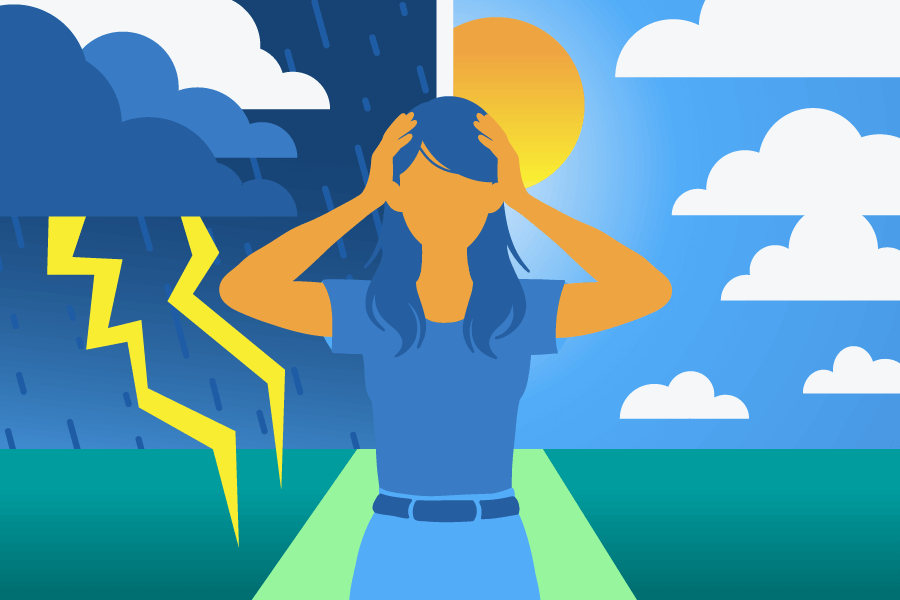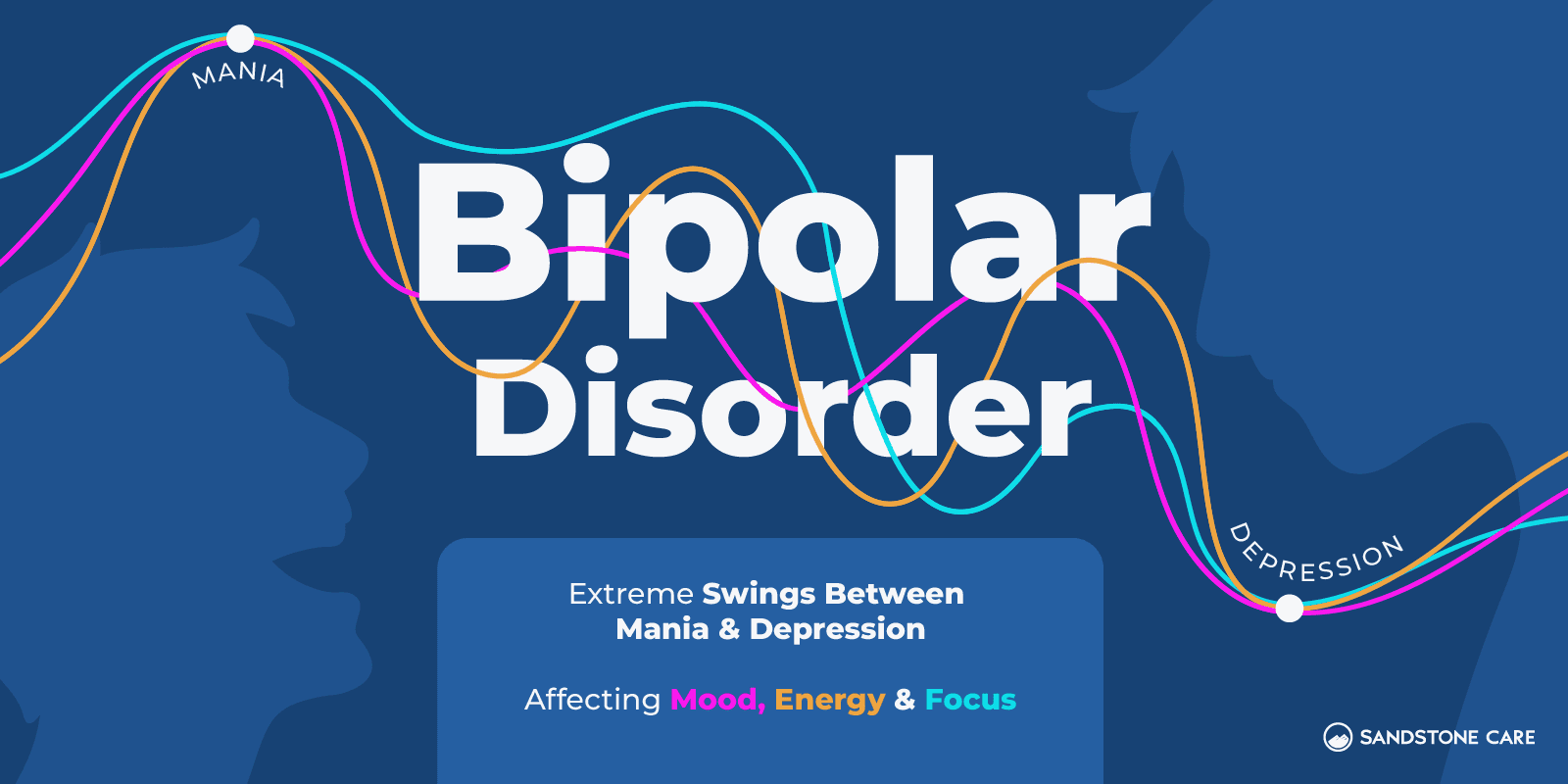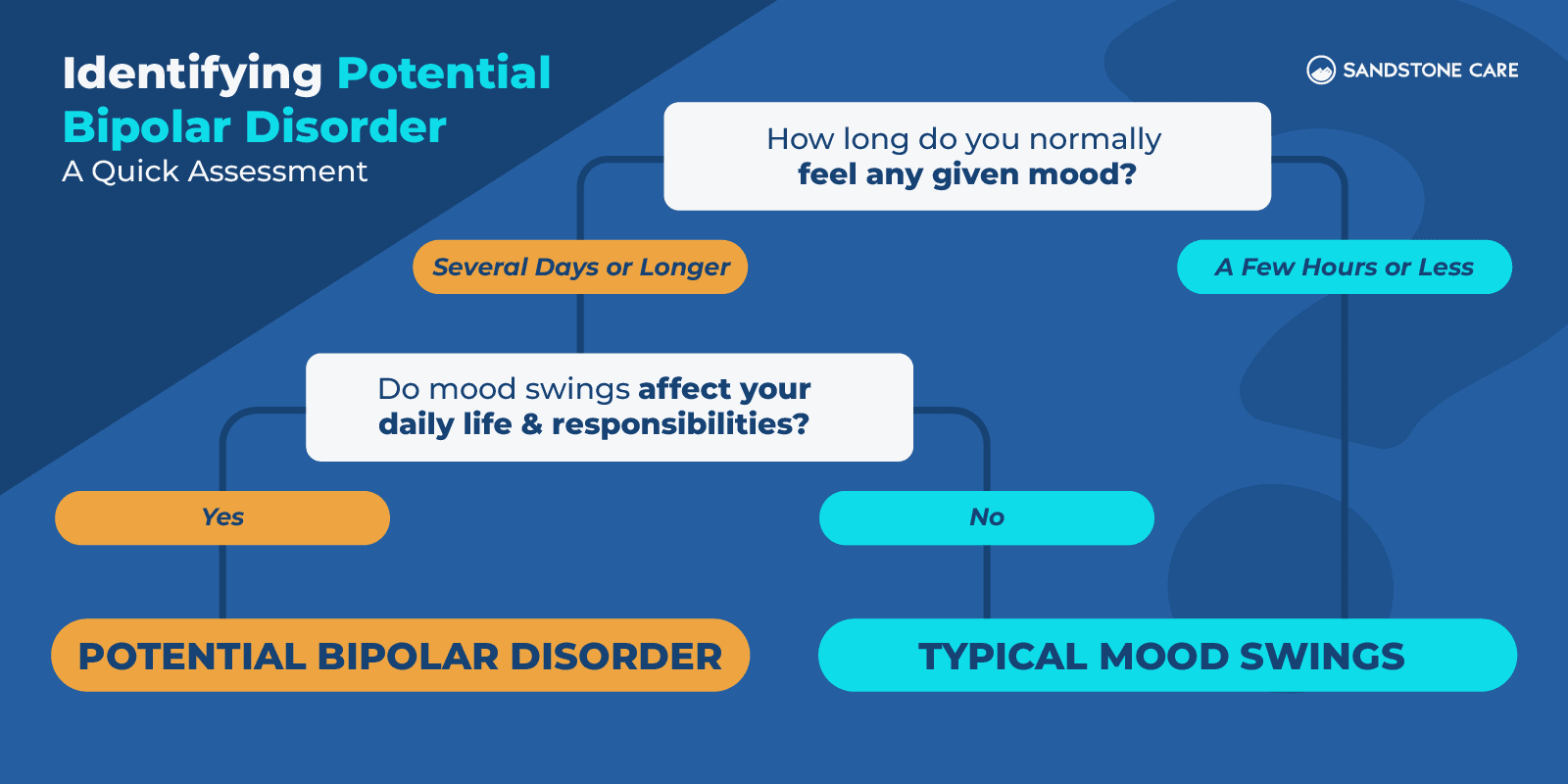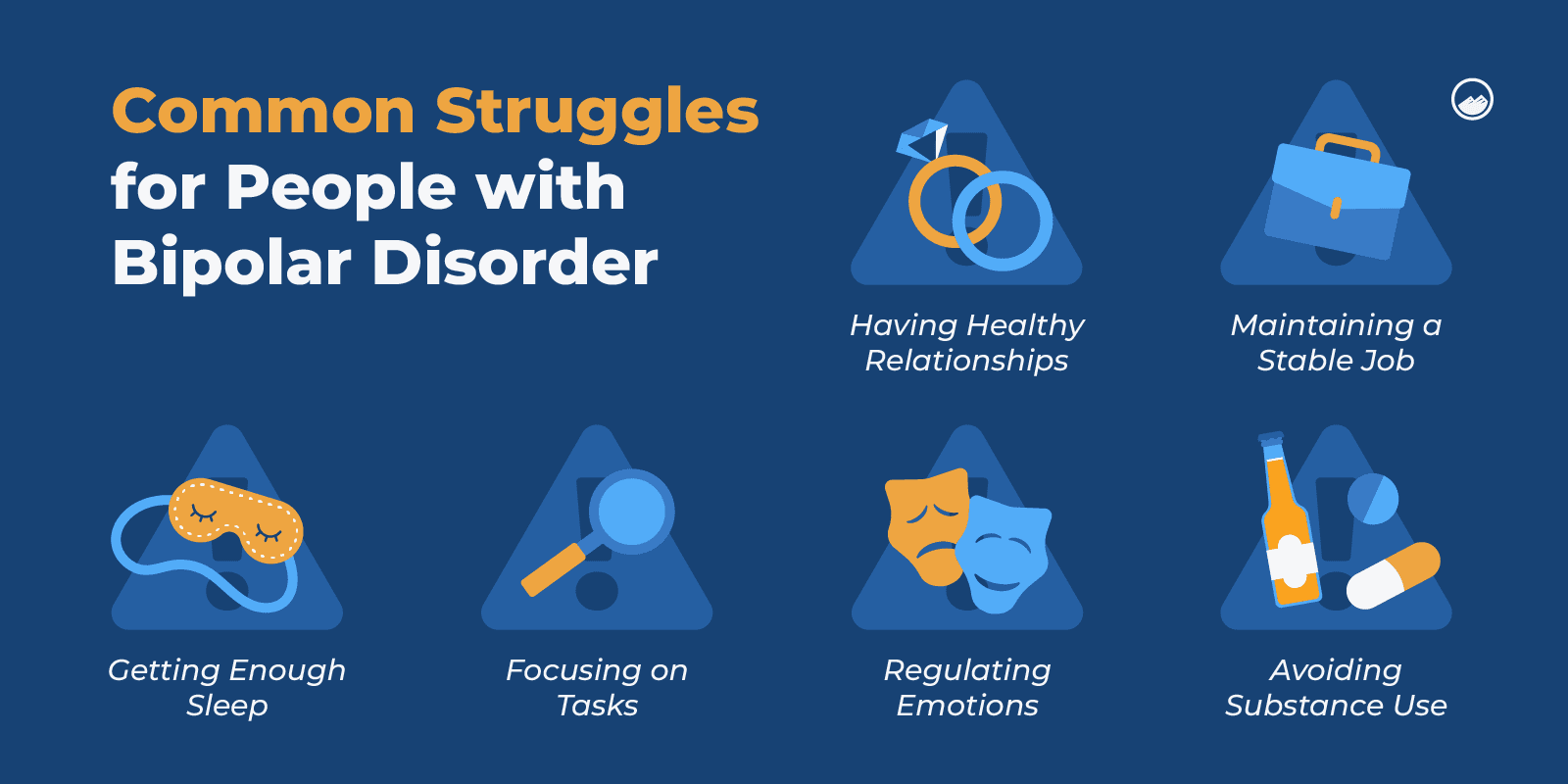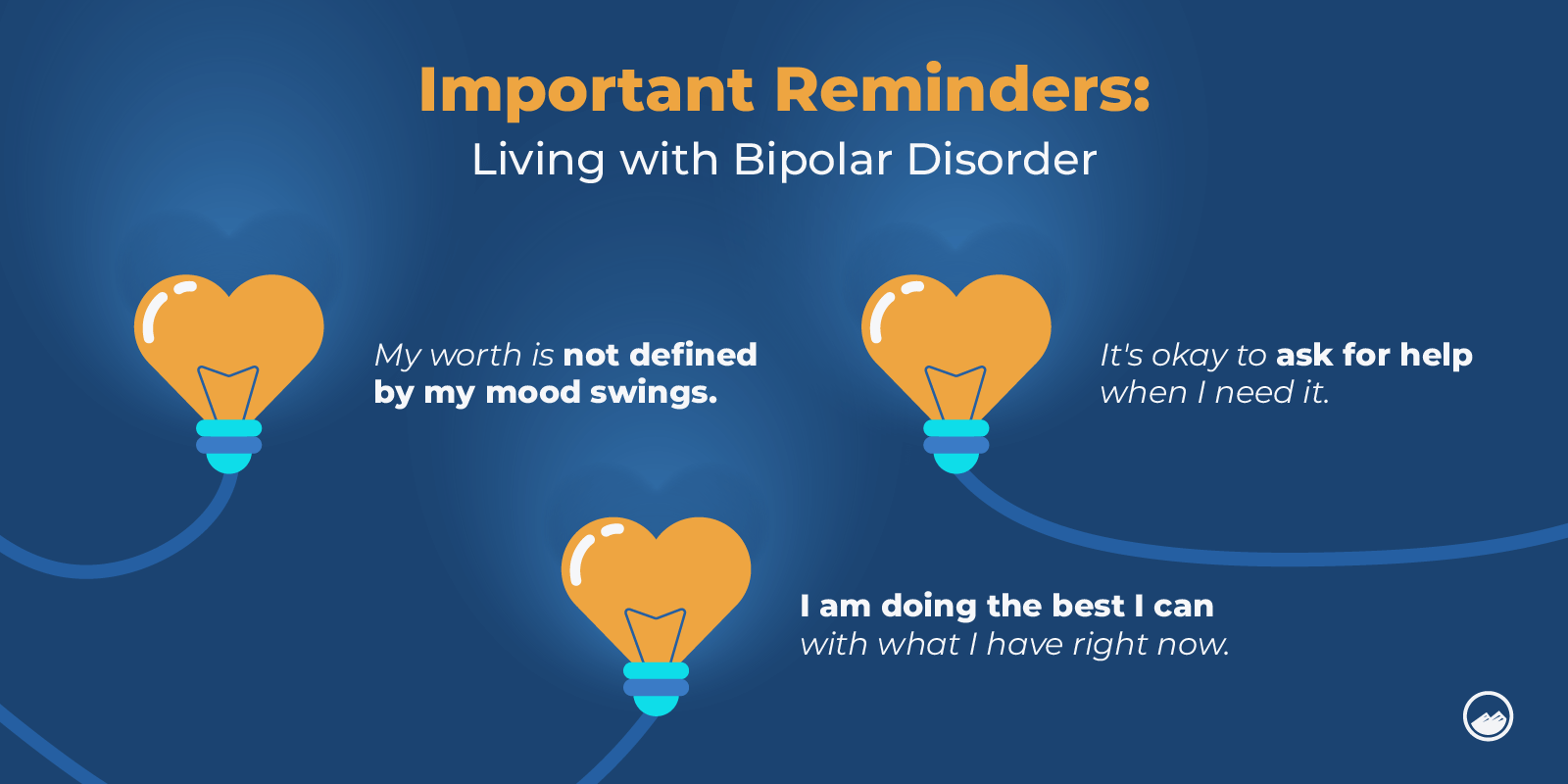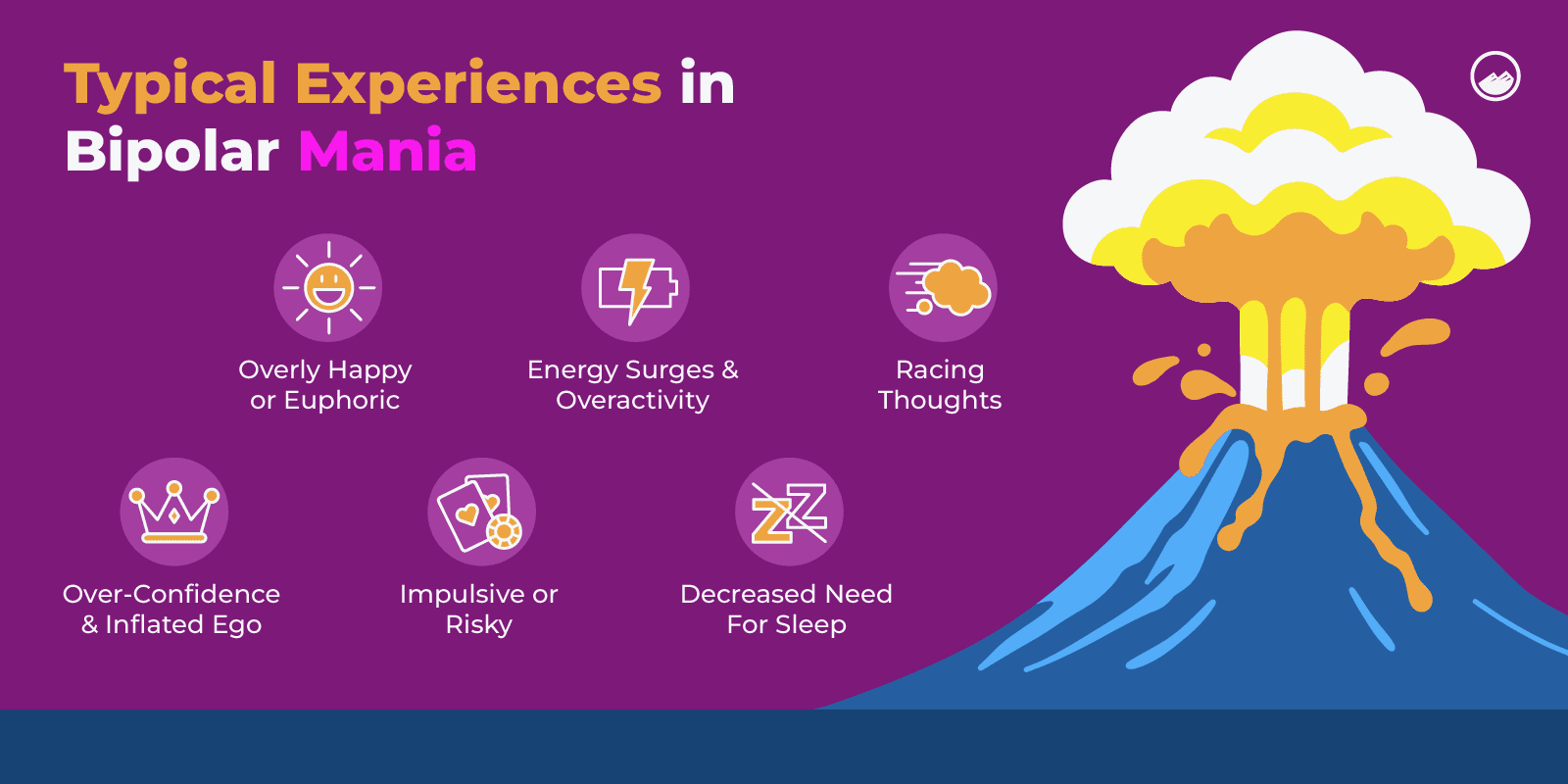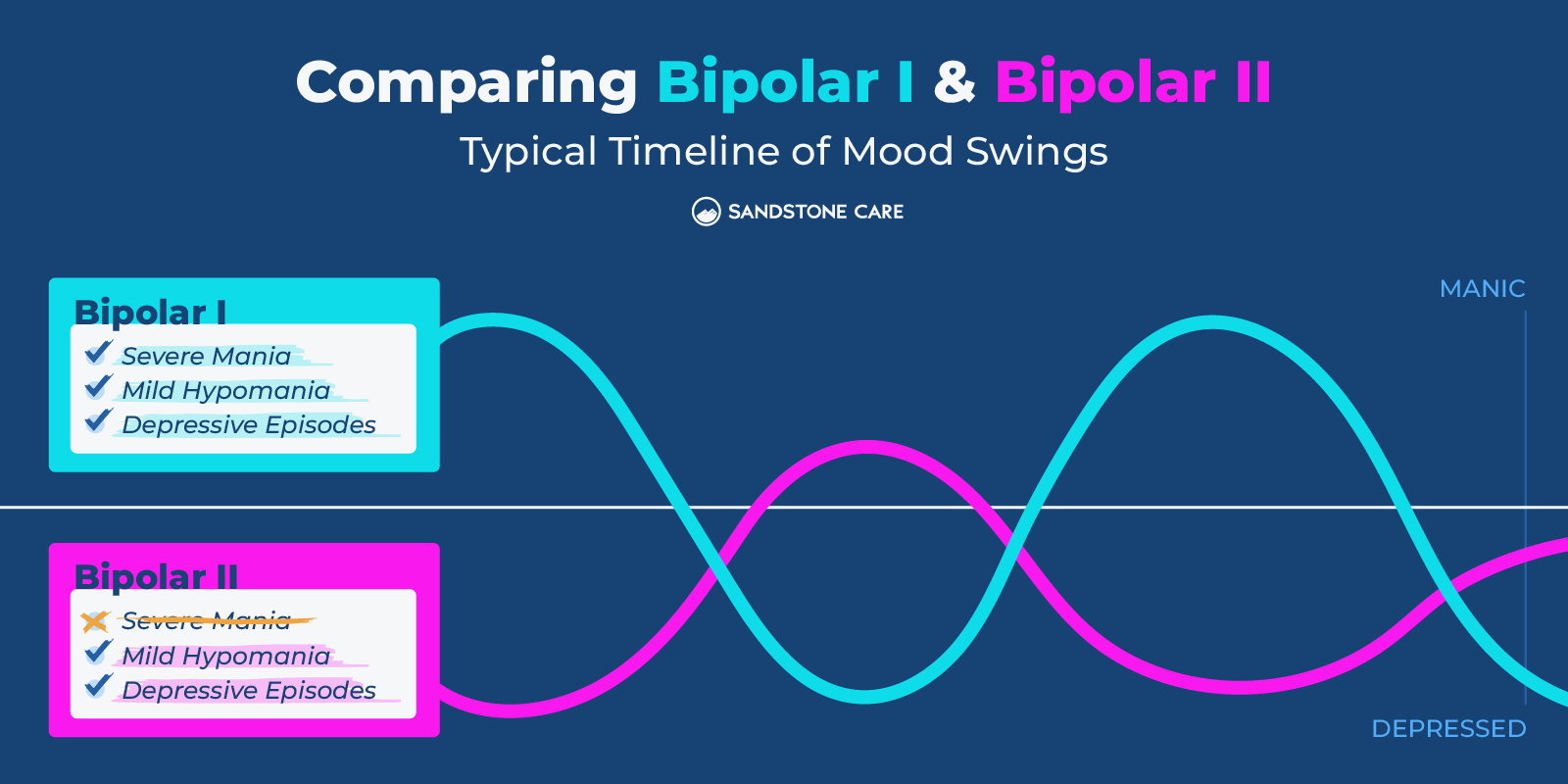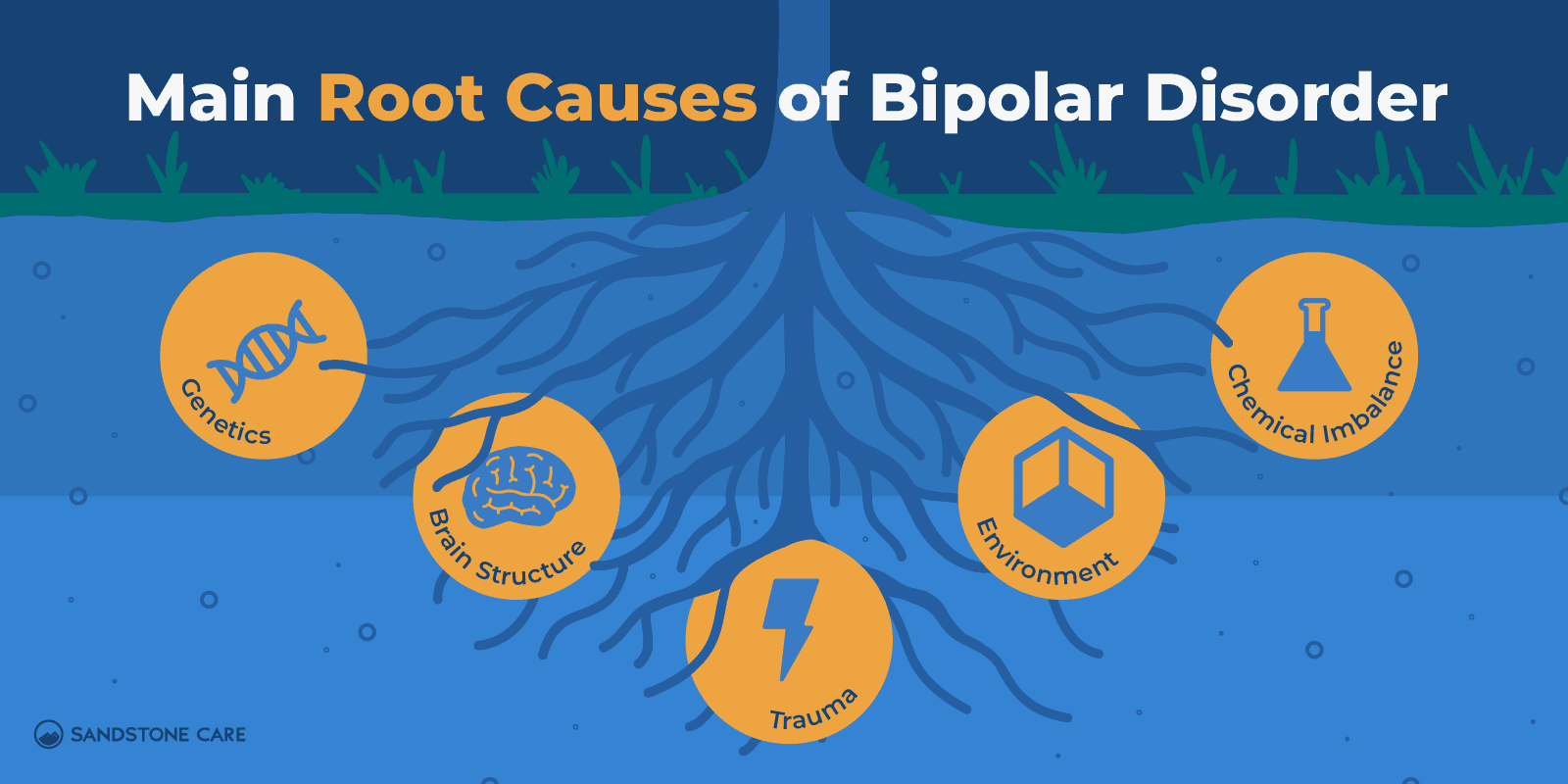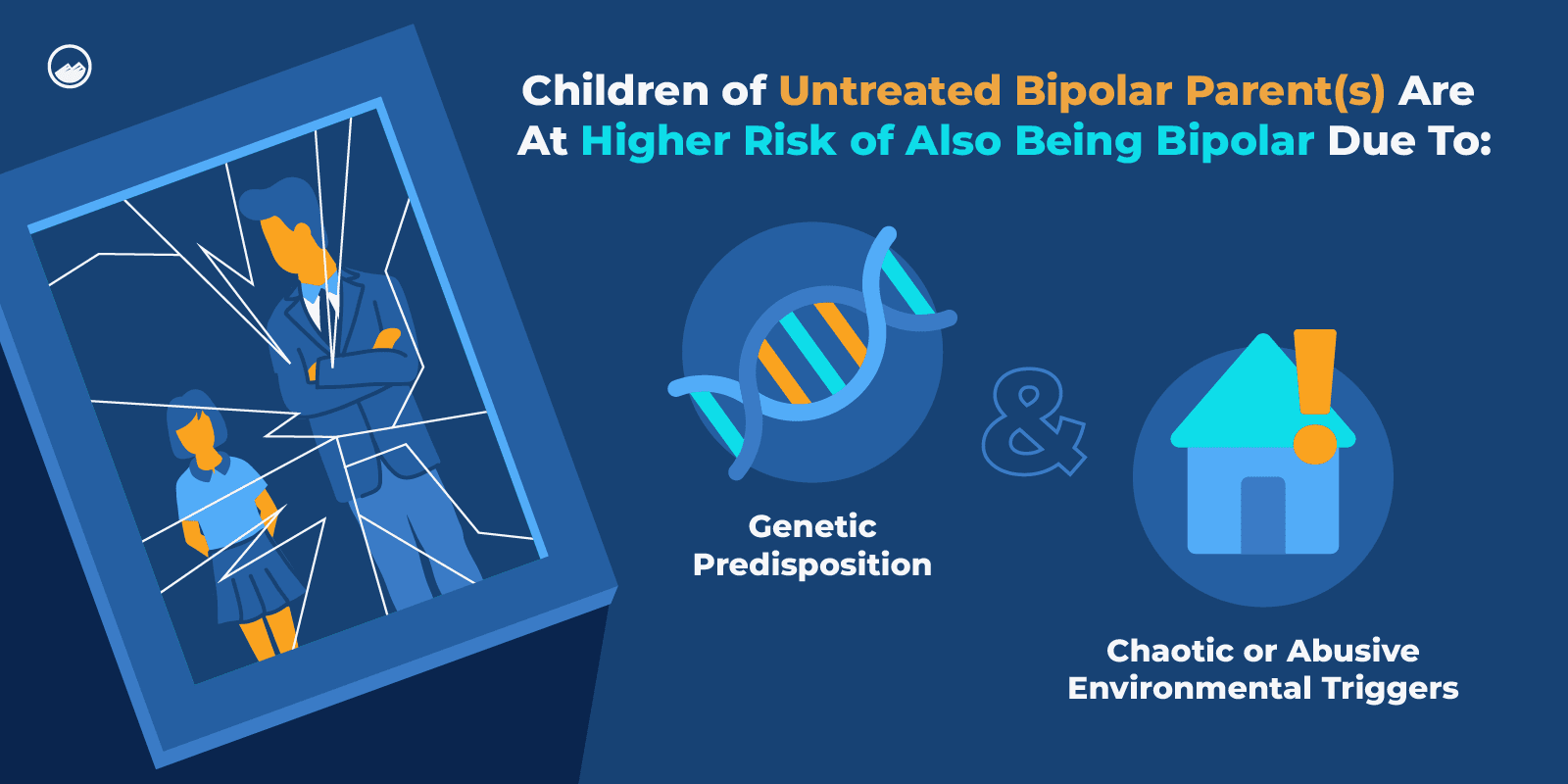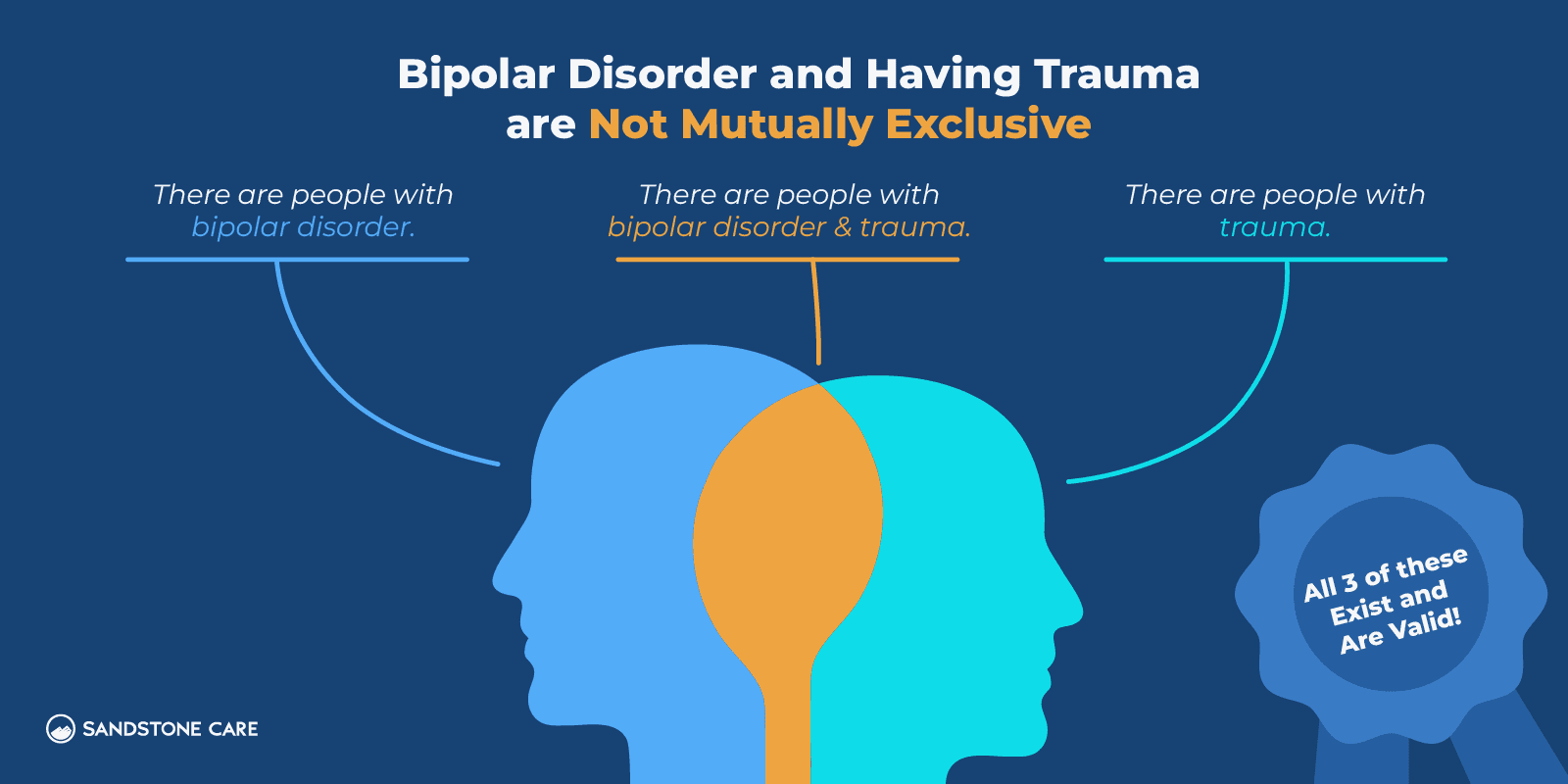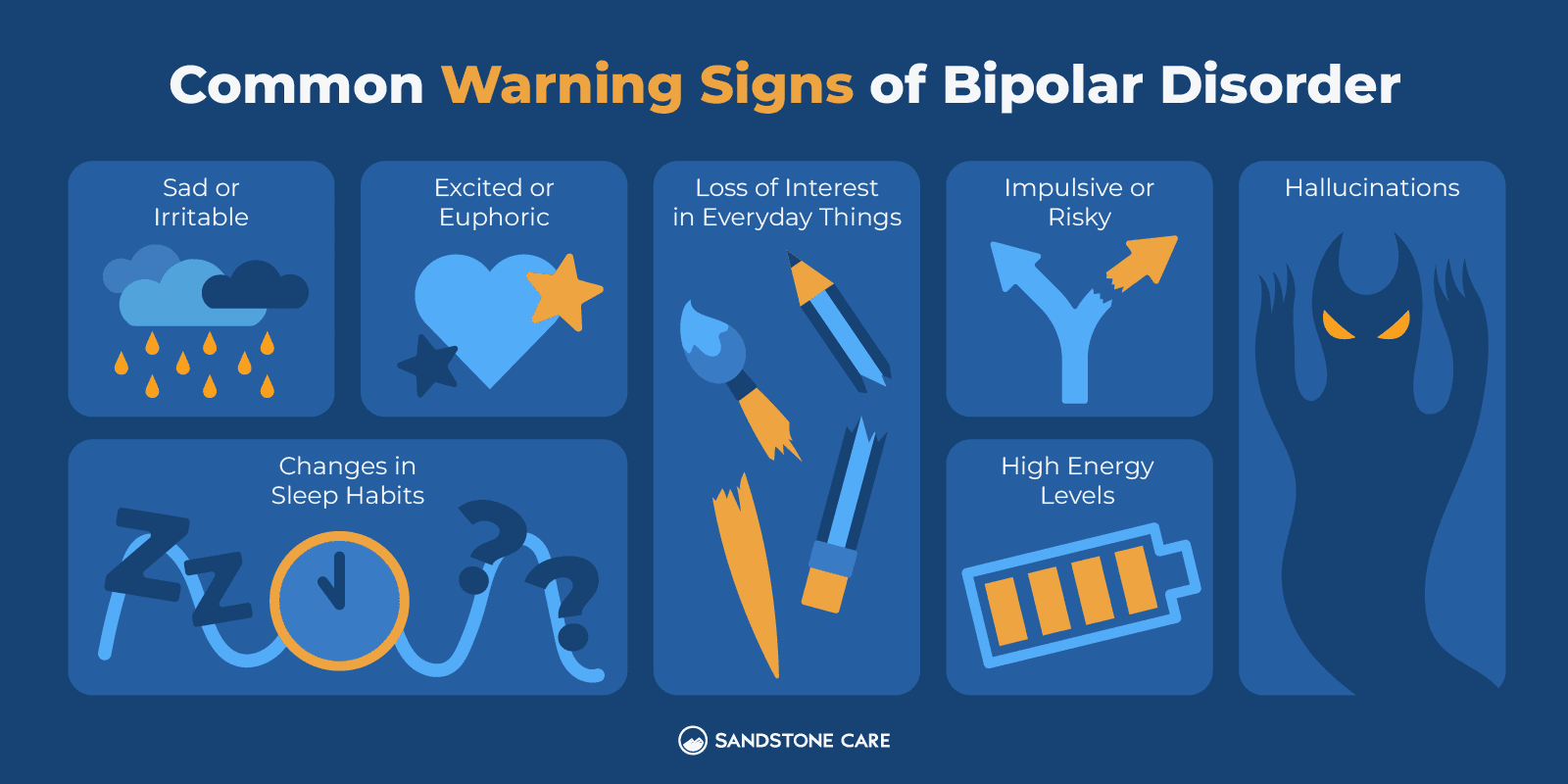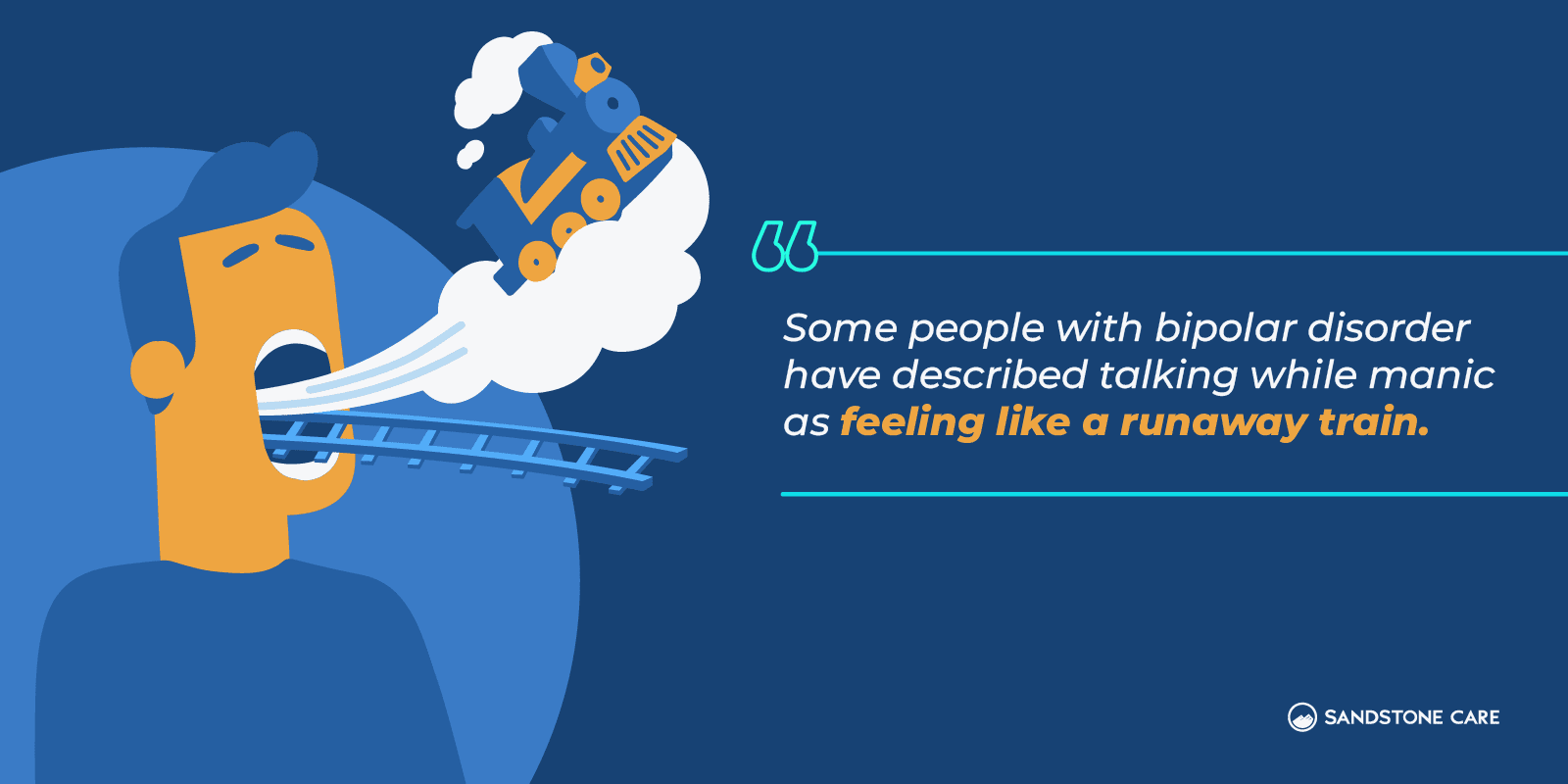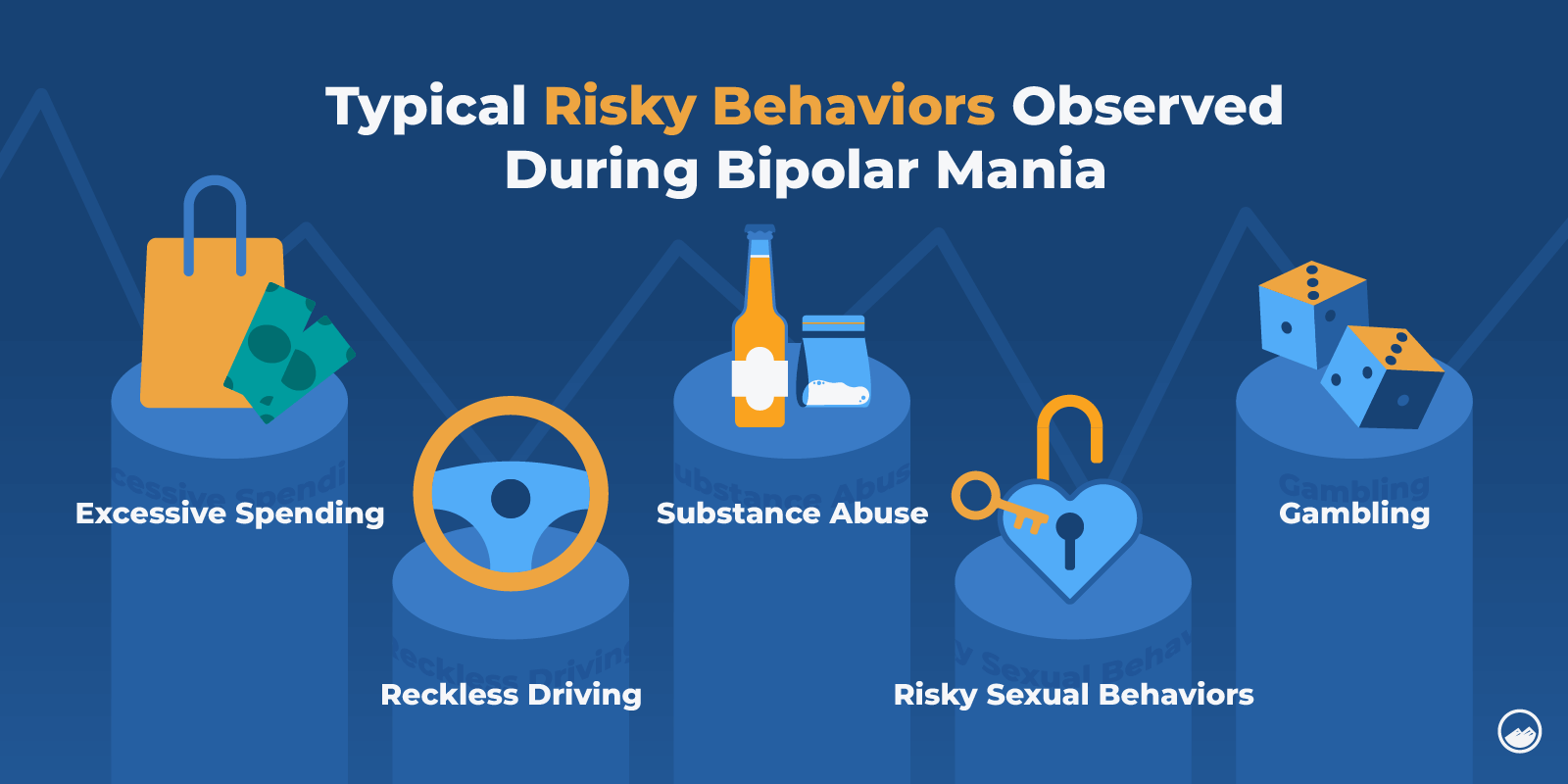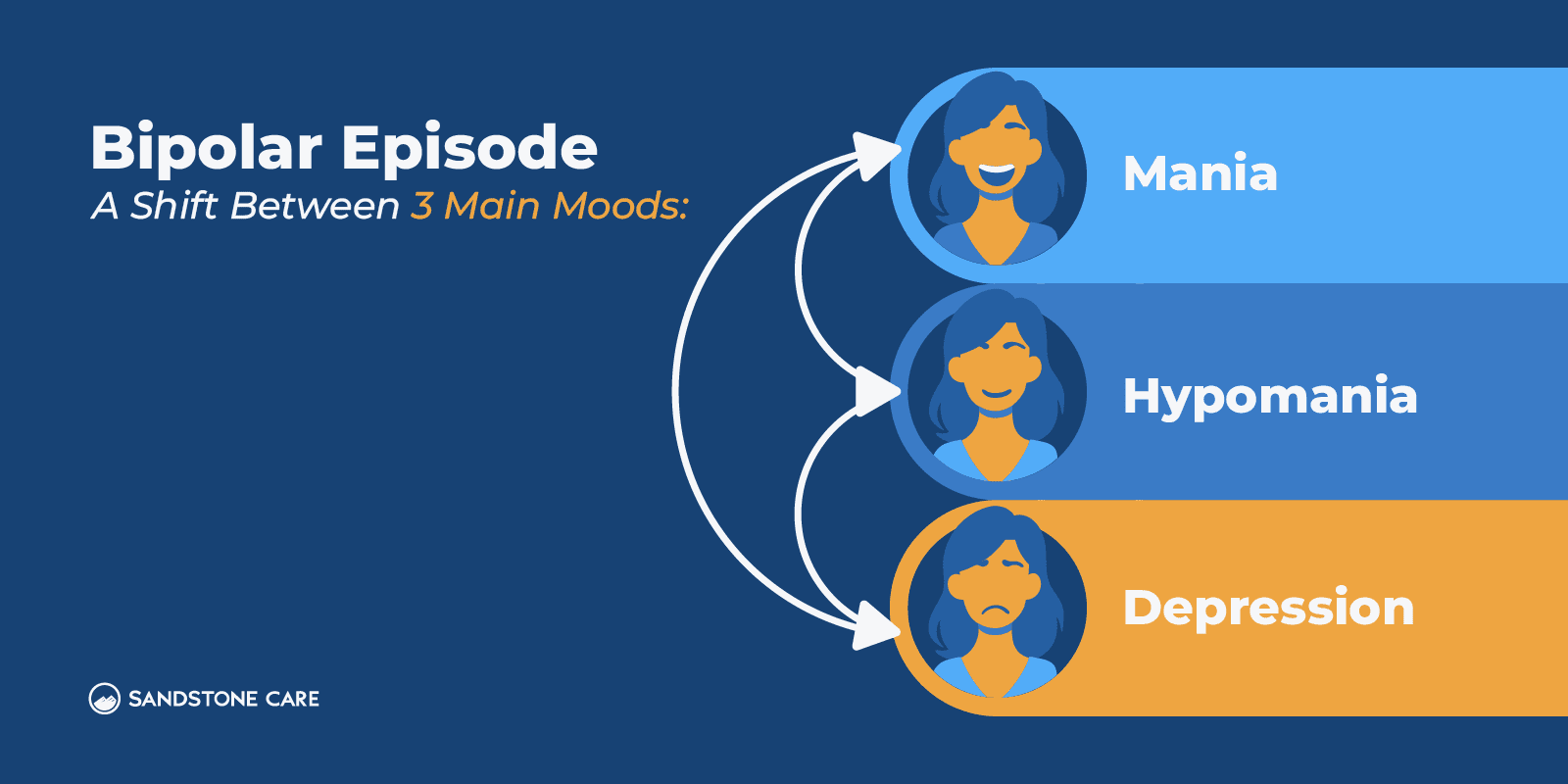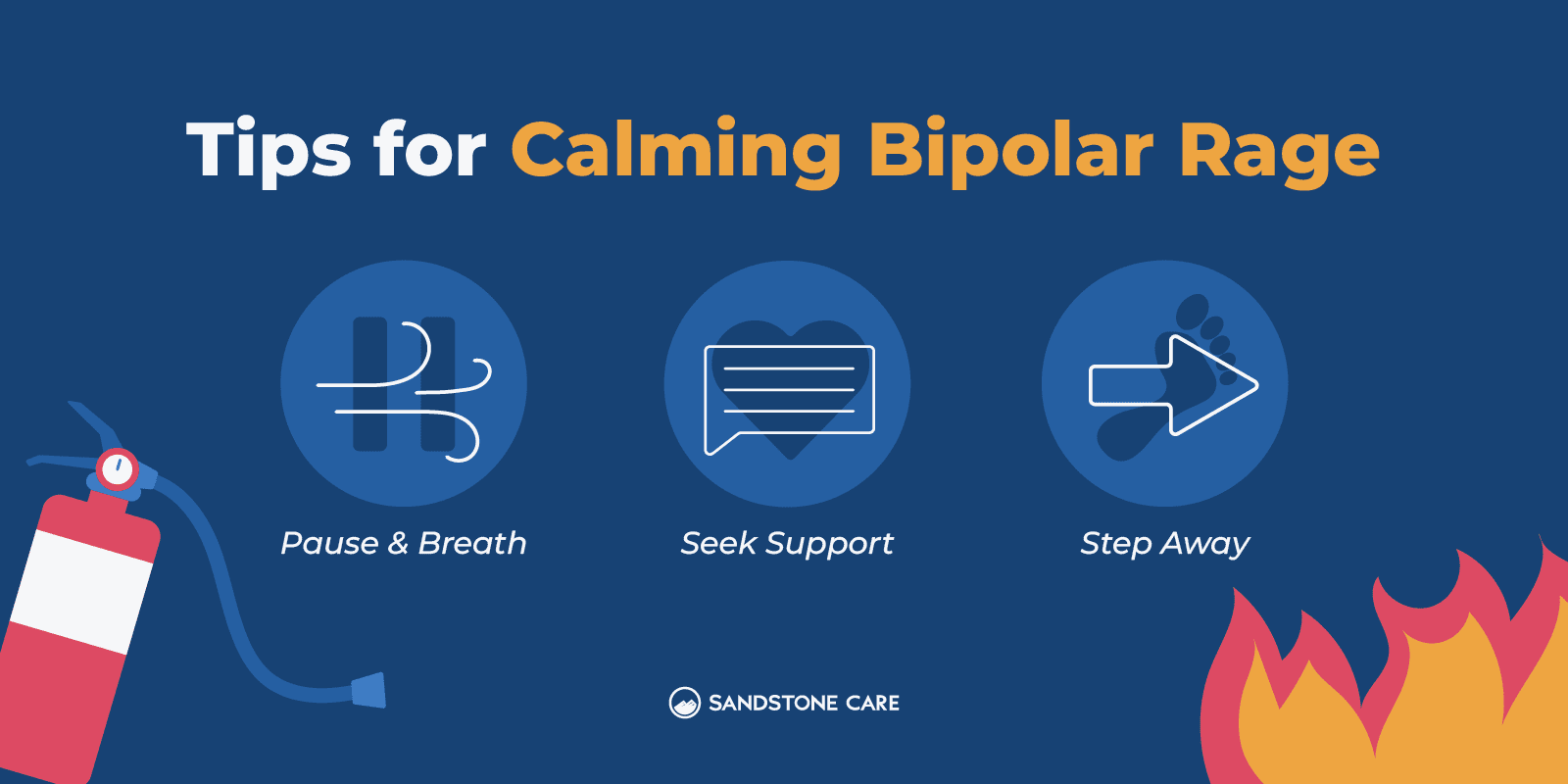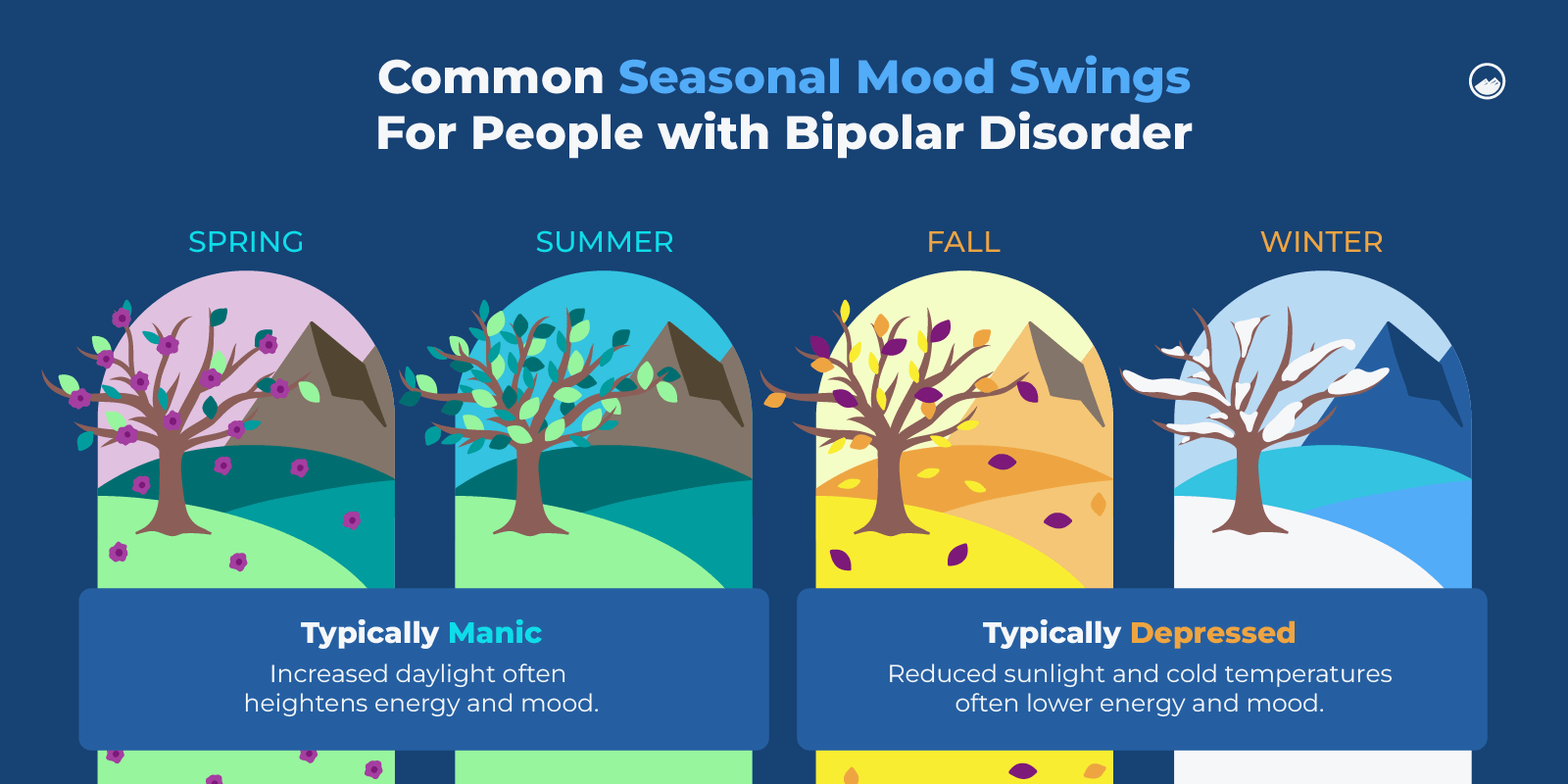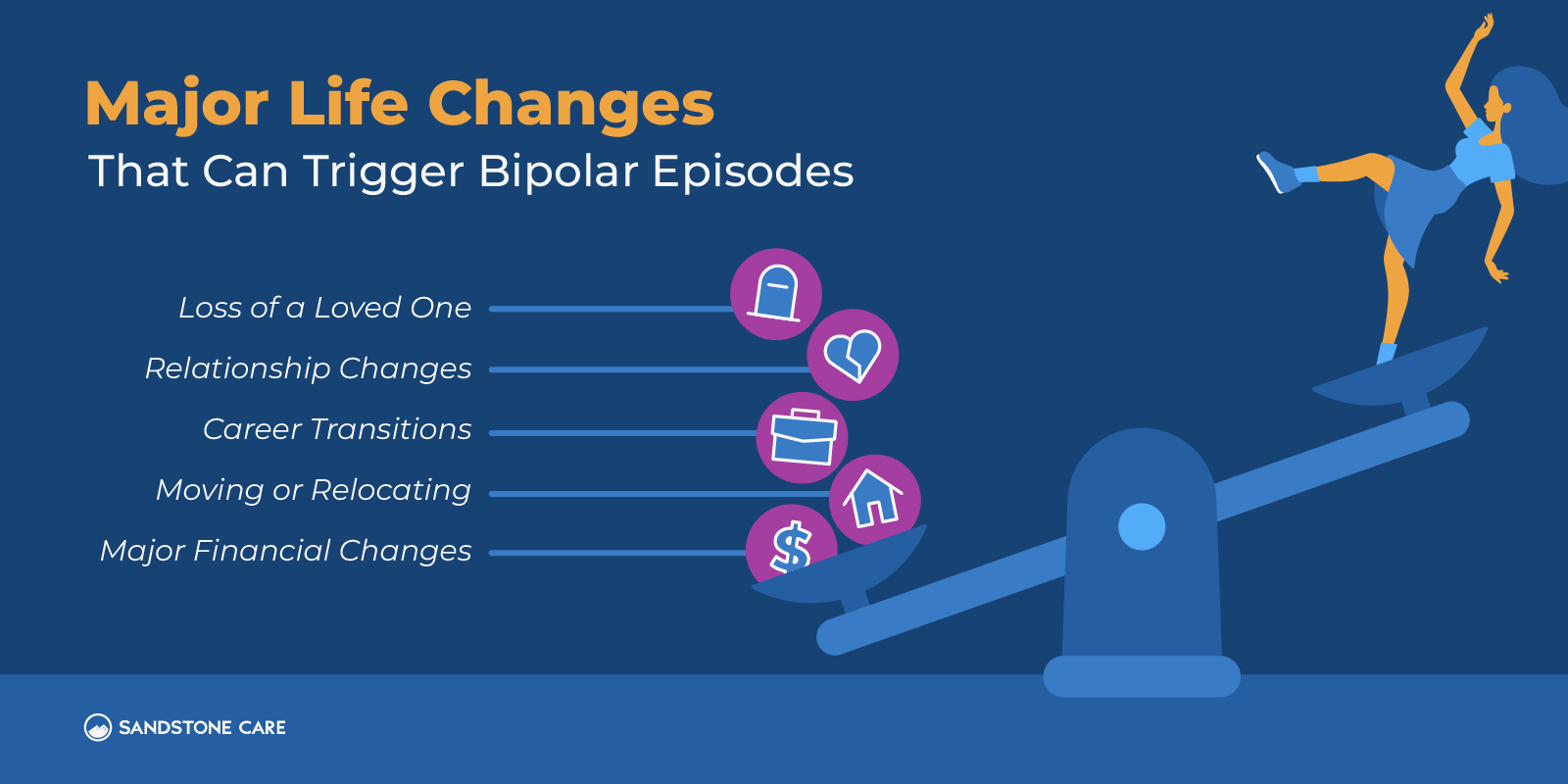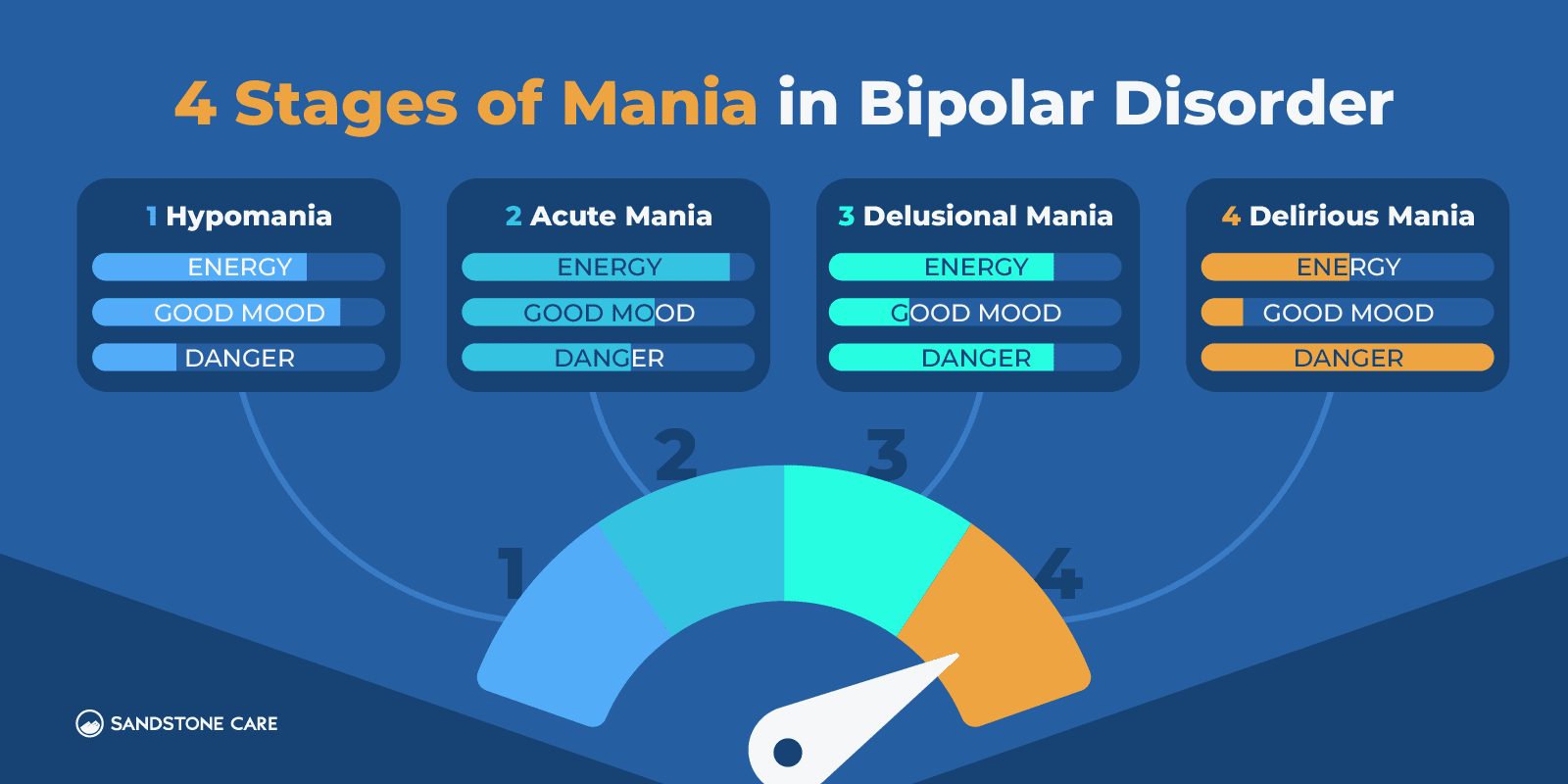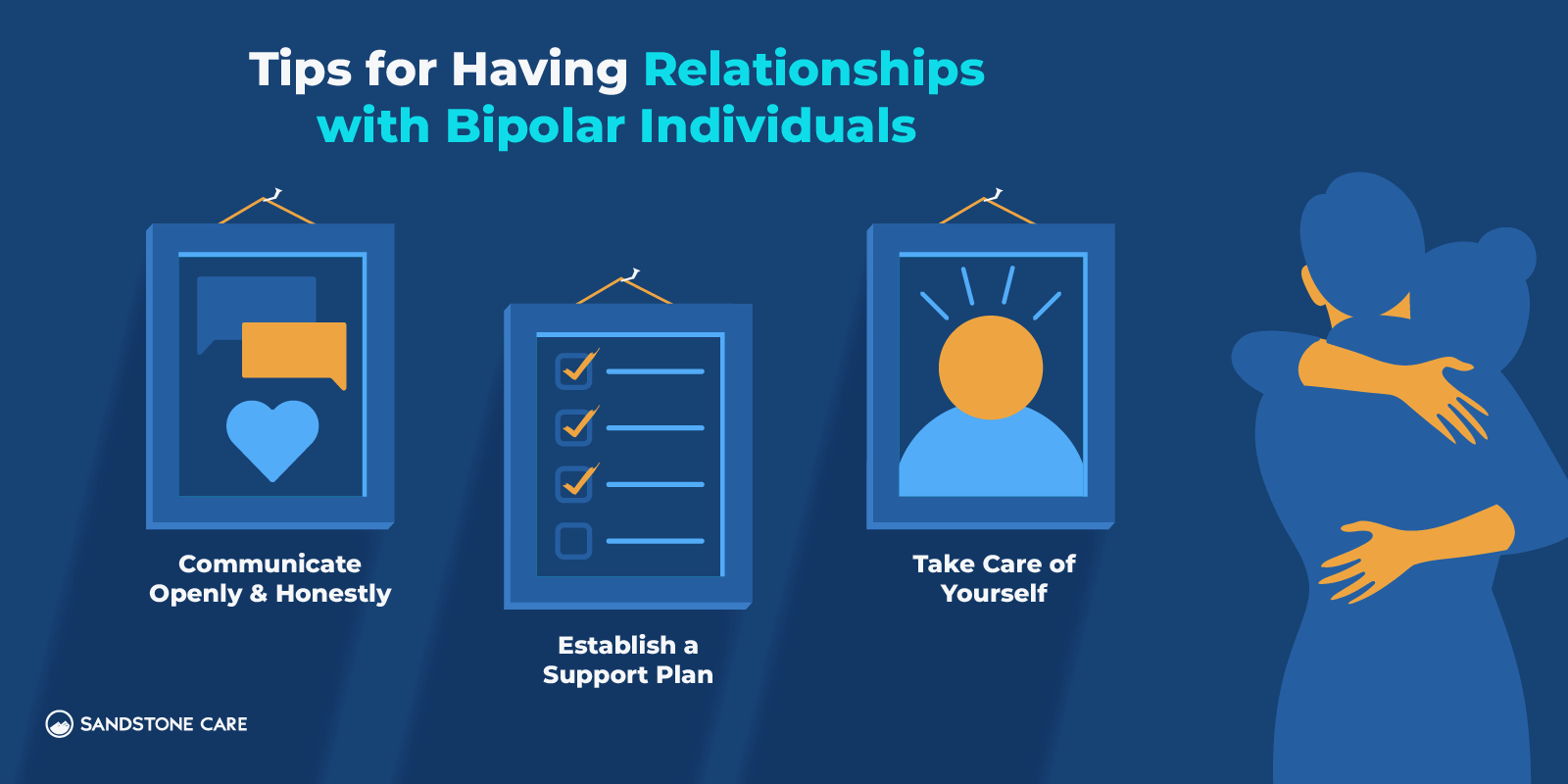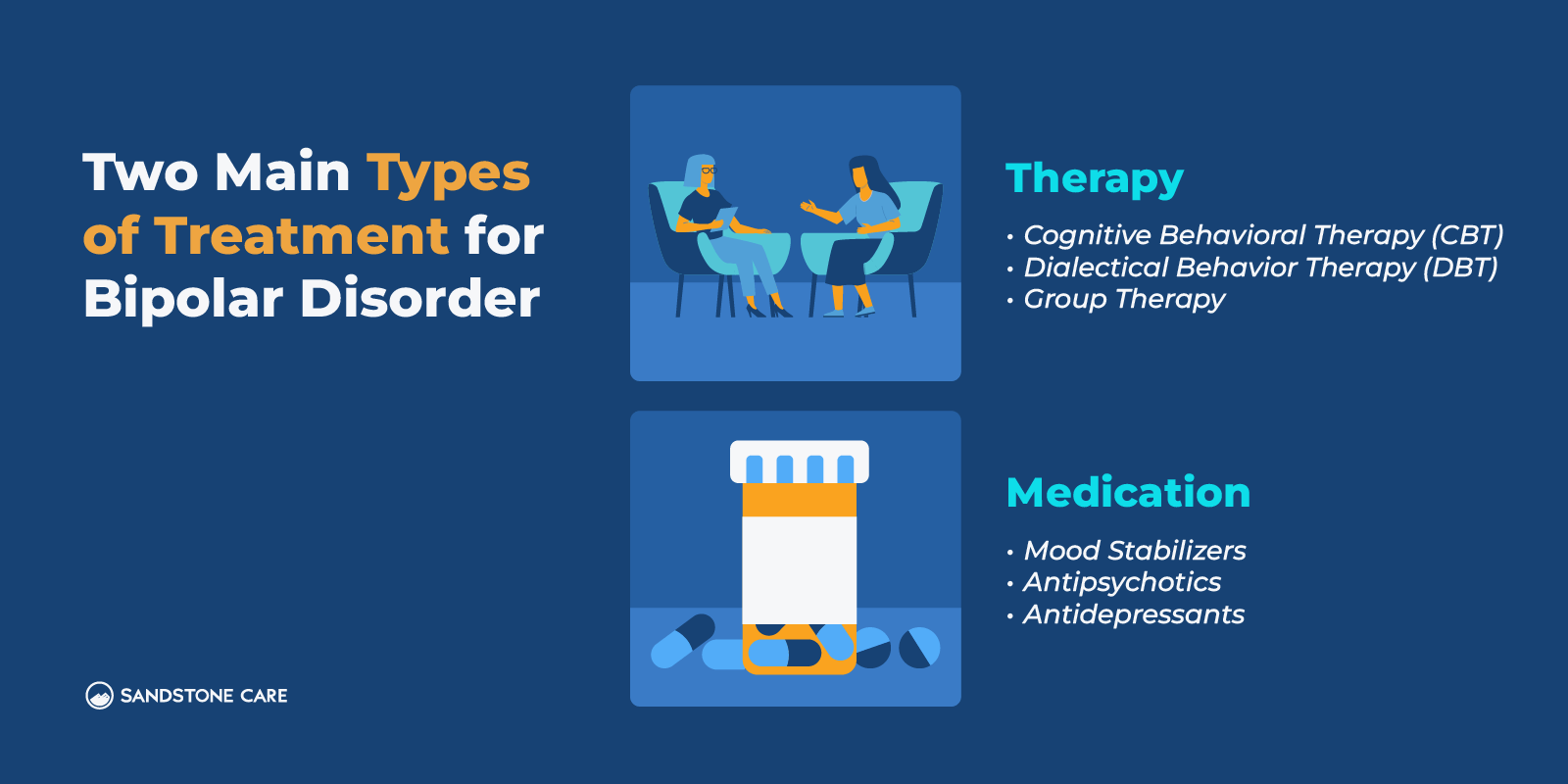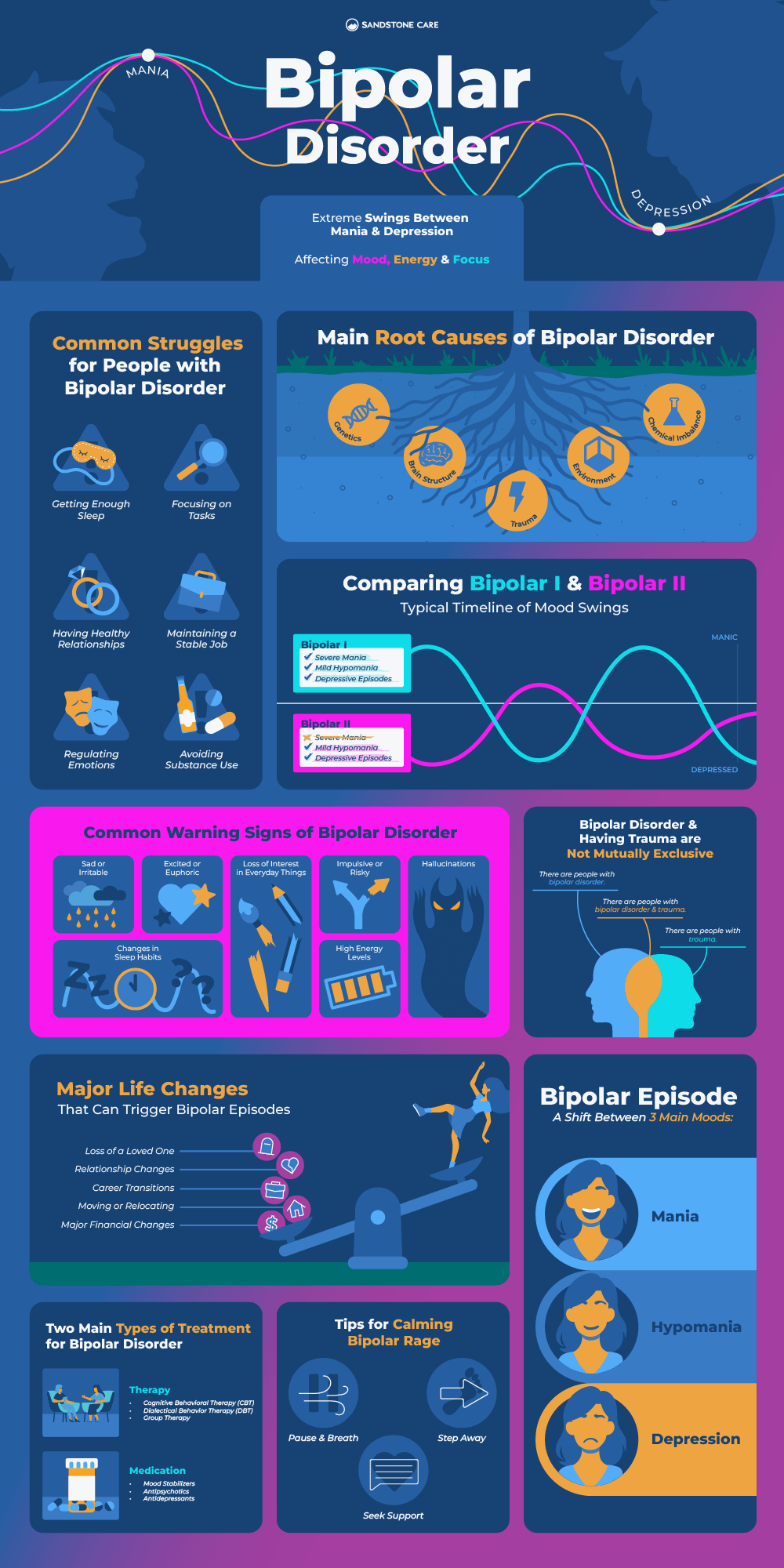Bipolar Disorder Overview
What Is Bipolar Disorder?
Bipolar disorder, once called manic depression, is a mental health issue causing intense mood swings, from extreme highs (mania) to lows (depression). It greatly affects mood, energy, and focus.
Am I Bipolar?
If you are experiencing severe mood shifts or any other signs of bipolar disorder, it is best to contact a healthcare professional or mental health professional to get a proper diagnosis.
Many mental health disorders share symptoms, so it can be tricky to identify exactly what condition you may have by yourself.
For example, some of the impulsivity found in attention disorders, such as ADHD, can be mistaken for the manic stage of bipolar.
Is Bipolar a Personality Disorder?
Bipolar disorder is identified as a mood disorder, not a personality disorder.
While people with personality disorders and people with bipolar disorder may both struggle with similar things, those with bipolar disorder experience their symptoms based around a severe cycle of highs and lows.
Personality disorders, on the other hand, include enduring patterns that aren’t cyclical.
When Does Bipolar Develop?
Bipolar disorder can develop at any age; however, it is most often diagnosed in the late teenage years or early twenties.
Bipolar disorder often appears in young adults because entering adulthood coincides with major changes in the brain, shifting hormones, and stressful life events.
Does Bipolar Get Worse With Age?
Research suggests that symptoms of bipolar disorder can progress and become worse with age, especially when left untreated.
However, it’s important to note that every single case of bipolar disorder is different.
Some people may find their symptoms fade as they enter a more stable period of their life, while others find that their mood shifts become more severe and destructive as they get older.
The risk of suicide often increases over time for those who struggle with bipolar disorder and don’t seek help. Many find that their symptoms stabilize and improve with treatment.
What Do People With Bipolar Struggle With?
Individuals with bipolar disorder may find it difficult to regulate their emotions.
These changes in one’s mood can make it very difficult to function daily and carry out everyday responsibilities.
Some things that people with bipolar struggle with include:
- Having healthy relationships
- Maintaining a stable job
- Getting enough sleep
- Regulating their emotions
- Concentrating or focusing on tasks
- Avoiding substance use
Why Is Bipolar Life Expectancy So Low?
The bipolar life expectancy is lower than the general population due to risk of suicide, difficulties managing physical health, and unhealthy coping mechanisms such as substance use.
Can People With Bipolar Be Happy?
Yes, a person with bipolar disorder can be happy, especially with effective treatments.
The intense highs and lows of bipolar disorder can make it feel impossible to find a healthy, balanced, and consistently happy life.
It’s easy for people with bipolar to blame themselves and feel broken after experiencing a bipolar episode.
However, these feelings of worthlessness do not need to be permanent, and careful treatment can help those with bipolar to feel better about themselves over time.
Types of Bipolar Disorder
There are three different types of bipolar disorder: bipolar I, bipolar II, and cyclothymic disorder.
What Is Bipolar 1?
Bipolar I is characterized by manic episodes that last for at least a week. But, it can also be defined by manic symptoms so severe that the person requires immediate care.
Often, bipolar I involves depressive episodes that last around two weeks.
What Does Untreated Bipolar 1 Look Like?
Untreated bipolar disorder can cause very high feelings of excitement or happiness followed by very low feelings of sadness, irritation, hopelessness, or anger.
These mood changes can impact a person’s life at work or school, making it very hard to keep up with these responsibilities. It can also be hard for the person to maintain interpersonal relationships.
What Is Bipolar Type 2?
Bipolar II disorder involves a pattern of both depressive and hypomanic episodes.
Bipolar II is a mood disorder characterized by cycles of depression and hypomania.
The manic episodes in bipolar II are usually less severe than those in bipolar I. These episodes involve milder symptoms.
People with bipolar II often spend more time in depressive episodes than hypomanic ones.
What Makes Bipolar 2 Worse?
Sometimes, individuals with bipolar disorder turn to substances as a way to cope, but this can trigger or worsen depressive and manic symptoms in bipolar disorder.
Additionally, if bipolar disorder goes untreated over time, it can worsen.
What Is the Difference Between Bipolar 1 and 2?
The main difference between bipolar II and II is that individuals with bipolar I disorder experience more severe episodes of mania, whereas individuals with bipolar II disorder experience less mania and more depressive episodes.
What Is Cyclothymia?
Cyclothymia is a mood disorder marked by ongoing shifts between periods of mild hypomania and mild depression.
These mood swings are less intense than those in standard bipolar disorder but still affect daily life.
Sometimes cyclothymia turns into bipolar disorder, but it doesn’t always do so.
What Is Bipolar Schizophrenia?
Bipolar schizoaffective disorder is a more uncommon mental illness that involves symptoms of schizophrenia and bipolar disorder, which also involves mania and depression.
Bipolar disorder involves mood swings between manic or hypomanic episodes and depressive episodes, while schizoaffective disorder features a combination of mood symptoms (such as depression or mania) and psychotic symptoms (such as hallucinations or delusions).
Manic and depressive episodes may trigger psychotic symptoms or worsen delusions.
What Is the Difference Between BPD and Bipolar?
The major difference is that borderline personality disorder affects the person’s ability to manage their emotions and impacts the way they think, feel, and act. Whereas bipolar disorder primarily impacts the person’s mood.
Borderline personality disorder (BPD) and bipolar disorder can share similar symptoms, such as depression and mood changes.
Sometimes, bipolar disorder may be misdiagnosed as BPD because of the overlap in symptoms.
Causes of Bipolar Disorder
What Causes Bipolar?
It is difficult to tell what the exact cause of bipolar disorder is.
However, certain factors can include:
- Genetic family history of bipolar disorder
- Brain structure
- Trauma
- Environmental factors
- Neurochemical imbalances
Is Bipolar Disorder Genetic?
Bipolar disorder can run in families, and many genes can be involved in the development of this disorder, according to the National Institute of Mental Health (NIH).
While genetics are a major risk factor in bipolar disorder, environmental factors play a large role in whether or not someone develops the disorder.
In home environments, untreated mental health conditions, such as bipolar disorder, may start a cycle of generational trauma that is difficult to uproot without professional intervention.
Is Bipolar Inherited From the Mother or Father?
Bipolar disorder can be inherited from either the mother or father.
Research suggests that genetic factors contribute significantly to the development of bipolar disorder, but it’s not as simple as being passed down from one parent.
Instead, multiple genes are likely involved, and the inheritance pattern can be complex.
Is Bipolar Caused by Bad Parenting?
Bipolar disorder cannot be caused by bad parenting. However, children who are at risk of developing bipolar disorder may have the condition triggered by childhood trauma, such as abuse or neglect.
Having a family history of bipolar disorder increases the risk of developing the condition, but it’s not solely determined by parenting practices.
Can Trauma Cause Bipolar Disorder?
While trauma on its own cannot cause bipolar disorder, research shows that childhood trauma has been linked to earlier development of bipolar disorder and greater severity of symptoms of bipolar disorder in adulthood.
Trauma, such as physical or emotional abuse, neglect, or other significant life stressors, can trigger mood episodes, or worsen existing symptoms in people who are at risk of developing bipolar disorder.
It’s important to note that not everyone who experiences trauma will develop bipolar disorder, and not everyone with bipolar disorder has experienced extreme trauma.
Signs of Bipolar Disorder
What Is the First Red Flag of Bipolar Disorder?
One of the bigger red flags of bipolar disorder is insomnia or excessive sleeping.
Other major red flags can include sudden shifts in mood, rapid talking, or experiencing interpersonal problems.
Every person with bipolar disorder has a unique relationship with their condition, which means that different signs will appear in different people.
What Are Signs of Bipolar?
Common warning signs of depression in bipolar disorder can include:
- Frequent feelings of sadness, hopelessness, or irritability
- Lack of energy
- Changes in sleep habits
- Self-doubt
- Lack of appetite
- Delusions or hallucinations
- Loss of interest in everyday things
Common signs of mania in bipolar depression can include:
- Feelings of extreme euphoria
- High energy levels
- Fast-talking
- Racing thoughts
- Impulsive decisions
- Feeling unusually important
- Saying or doing things that are out of character
Do People With Bipolar Lie Often?
Lying is not considered to be a direct symptom of bipolar disorder.
However, during episodes of mania or hypomania, some individuals with bipolar disorder may engage in impulsive or reckless behavior, which could include dishonesty or deceitful actions.
Bipolar disorder can also distort a person’s perception of events and relationships, which can cause them to claim things that aren’t true. However it’s important to note that this is different from lying intentionally.
What Are Bipolar Eyes?
Sometimes, when a person is going through a manic episode, their eyes may change in appearance.
Their pupils can become dilated, their eyes may look “sparkling,” or they have a narrowed gaze.
What Is Bipolar Mouthing?
Bipolar mouthing is when a person with bipolar disorder experiences speech disruptions, such as rapid or excessive talking that is difficult to stop or redirect.
Some people with bipolar disorder have described this experience as feeling “like a runaway train” when they are having these conversations.
Bipolar Disorder Symptoms
How Does Bipolar Affect Someone?
Bipolar disorder affects a person’s everyday life when mood shifts disrupt their ability to maintain a consistent balance with their work, school, personal life, and relationships.
Especially when left untreated, bipolar disorder can significantly impact a person’s mental and physical health and overall well-being.
What Are the Symptoms of Bipolar Disorder?
Common symptoms of a manic episode in bipolar disorder can include:
- Feeling very elated or excited
- Irritability
- Sudden and impulsive decisions
- Racing thoughts
- Struggling to focus
- Decreased sleep or insomnia
- Talking fast
- Excessive appetite
- Doing many things at once
- Feeling unusually powerful or confident
Common symptoms of a depressive episode in bipolar disorder can include:
- Feelings of sadness or anxiety
- Restlessness
- Difficulty concentrating or making decisions
- Feeling unable to complete simple or everyday things
- Forgetfulness
- Talking slowly
- Hopelessness and worthlessness
- Suicidal thoughts or ideation
If you or a loved one are experiencing suicidal thoughts, call 911 or call the National Suicide Prevention Lifeline at 988.

Is this blog hitting close to home?
We’re here to help.
What Is a Bipolar Episode?
A bipolar episode happens when a person with bipolar disorder experiences a distinct shift in their mood and energy levels. There are three main types of bipolar episodes:
- Manic Episode
A manic episode is marked by intense highs in mood and energy. Symptoms include decreased need for sleep, racing thoughts, inflated self-esteem, impulsivity, and risky behaviors like excessive spending or reckless driving. There may also be psychotic symptoms. - Hypomanic Episode
A hypomanic episode is similar to a manic episode but less severe. It involves abnormally elevated mood and increased energy or activity levels. It includes elevated mood and increased energy but doesn’t cause major problems in daily life.
- Depressive Episode
A depressive episode is marked by persistent low mood, loss of interest, changes in appetite or sleep, fatigue, feelings of worthlessness, difficulty concentrating, and thoughts of suicide.
Bipolar episodes can look different from person to person, and they can happen at different rates. Rapid cycling is when a person experiences four or more mood episodes within a year.
How Long Do Bipolar Episodes Last?
In bipolar I disorder, manic episodes last at least seven days and depressive episodes typically last at least two weeks.
Individual differences, including genetics, brain chemistry, and overall health, play a significant role in shaping the length and frequency of episodes.
What Does Bipolar Rage Look Like?
When a person is going through a bipolar episode, they might experience uncontrollable and extreme anger.
They might scream, yell, act erratically, or engage in conflict with the people around them.
Experiencing bipolar rage can be deeply distressing for both the person affected and those close to them. It’s crucial for individuals living with bipolar disorder to reach out for support from mental health professionals and trusted loved ones.
How Do You Calm a Bipolar Rage?
Certain ways to help calm or cope with bipolar rage can include:
- Distancing yourself from what is triggering your anger
- Practicing mindfulness or meditation techniques
- Reaching out to a family member or friend
- Engaging in a calming activity like listening to music or journaling
- Keeping up with therapy sessions
What Is a Bipolar Blackout?
A bipolar blackout is when a manic episode causes someone with bipolar disorder to become unaware of their surroundings.
Afterward, individuals may feel disoriented or confused as they attempt to recall events from the blackout period. Some may experience stretches of total memory loss during the episode.
What Triggers a Person With Bipolar Disorder?
While everyone has different triggers, one of the biggest triggers for a person with bipolar disorder is stress.
Other triggers include:
- Stressful life events
- Changes in sleep patterns
- Substance abuse
- Medication changes
- Seasonal changes
- Hormonal fluctuations
- Lack of routine or structure
- Interpersonal conflicts
- Financial difficulties
- Physical illness or medical conditions
Do Bipolar People See Things That Aren’t There?
Yes, sometimes in severe bipolar disorder, a person may experience hallucinations or see things that aren’t there.
Hallucinations can occur during severe manic or depressive episodes or during mixed episodes, where symptoms of mania and depression are both present.
These hallucinations can take various forms, such as seeing objects, hearing voices, or feeling sensations that others don’t perceive.
What Do Bipolar Delusions Look Like?
Individuals with bipolar disorder can experience delusions that make them believe things, such as believing they are famous or excessively important or believing someone is spying on them or following them.
Bipolar Mania
What Is Mania in Bipolar?
Mania is a sudden shift in behavior and mood where a person experiences elevated mood, energy, and activity levels.
Mania in bipolar disorder is characterized by intense feelings of euphoria or irritability, rapid speech, racing thoughts, and a decreased need for sleep.
People may engage in impulsive behaviors like excessive spending, reckless driving, or risky sexual activities. They might also exhibit grandiosity, believing they possess special abilities.
Am I Manic or Just Happy?
Mania isn’t just feeling happy—it’s a powerful and lasting surge of energy and mood that can cause impulsive actions, poor decision-making, and difficulties with day-to-day responsibilities.
When a person is manic, they might even feel euphoric, but these feelings are temporary and are often followed by a severe low.
What Is Hypomanic?
Hypomania is a milder form of mania found in bipolar disorder. It involves increased mood and energy levels, but it’s not as severe as full-blown mania.
People may feel more creative, productive, and social during hypomanic episodes.
What Triggers a Manic Episode?
Common triggers of a manic episode can include:
- Overstimulating environments
- Major life changes
- Loss of sleep
- Substance use
Can You Have a Manic Episode and Not Be Bipolar?
Manic episodes can be experienced without having bipolar disorder.
However, manic episodes often have to do with some type of underlying mental health problem or related disorder, such as affective disorders or postpartum psychosis.
What Do You Say to a Manic Person?
If someone is going through a manic episode, one of the most important things to do is to try to stay calm.
If they are saying things that are difficult to process, you can also tell them that you are glad they are talking to you about it or feel safe enough to tell you.
What Are the 4 Stages of Mania?
Mania can be divided into 4 stages, which can include hypomania, acute mania, delusional mania, and delirious mania.
- Hypomania: Mild mania with increased mood and energy, often linked to creativity and sociability. Doesn’t disrupt daily life or involve psychosis.
- Acute Mania: Severe mania with intense mood elevation, leading to impulsive behavior and disruptions in functioning.
- Delusional Mania: Mania with fixed false beliefs (delusions), like grandiosity or paranoia.
- Delirious Mania: Extreme mania with agitation, confusion, hallucinations, needing urgent medical attention.
Bipolar Depression
What Is Bipolar Depression?
Bipolar depression is when a person with bipolar disorder is going through a depressive episode that causes them to experience low levels of energy, activity, and mood.
Other symptoms may include changes in appetite, sleep disturbances, difficulty concentrating, and thoughts of death or suicide.
Why Do Bipolar People Sleep a Lot?
A person with bipolar disorder might sleep a lot because their energy levels are so low or because they are experiencing feelings of hopelessness and sadness that they have no motivation to do anything else.
What Are Three Symptoms of Bipolar Depression?
The three biggest symptoms of depression in bipolar disorder can include:
- Feelings of hopelessness and sadness
- Experiencing difficulty sleeping or sleeping too much
- Difficulty completing everyday tasks and responsibilities
How Is Bipolar Depression Different From Regular Depression?
Bipolar depression is very similar to regular depression, but one of the major differences is that the “low” period in bipolar depression is followed by an extreme “up” period.
This cycling nature of bipolar disorder may require different treatment plans than standard depression.
For instance, individuals with bipolar episodes of depression may need mood stabilizers or antipsychotic medications to manage manic or hypomanic episodes.
How Debilitating Is Bipolar Depression?
Bipolar depression can be debilitating and make it very difficult to get through everyday life.
They might isolate themselves and find it impossible to keep up with things like work, school, or even things such as self-care or eating.
Bipolar Relationships
Why You Shouldn’t Argue With a Bipolar Person?
It is normal to have occasional conflict or disagreements in a relationship; however, arguing with a bipolar person can escalate the situation and lead to more conflict and problems for both parties.
Instead of arguing, they should take space from each other and come back to talk when both people are calm.
Why Do Bipolar People Push Family Away?
A person with bipolar disorder might push loved ones away because they are at a low point and don’t want to burden others.
They also might not know how to process what they are going through, making it difficult to talk to others about it.
Do Bipolar People Care About Anyone?
Yes, individuals with bipolar disorder are fully capable of caring about others, however, mood episodes can sometimes affect how emotions are expressed or experienced.
During manic episodes, individuals may be more outgoing, impulsive, or emotionally intense, while depressive episodes may lead to withdrawal or reduced emotional responsiveness.
However, the presence of bipolar disorder does not diminish a person’s capacity for empathy, compassion, or love.
Can a Bipolar Person Be a Good Parent?
A person with bipolar disorder can still be a good parent.
Many individuals with bipolar disorder successfully manage their symptoms with treatment, allowing them to provide a loving, stable, and nurturing environment for their children.
It’s important for parents with bipolar disorder to prioritize their mental health, seek appropriate treatment, and develop coping strategies to effectively manage their symptoms.
Bipolar Disorder Treatments
Is There a Permanent Cure for Bipolar Disorder?
There is currently no permanent cure for bipolar disorder. However, treatment and therapy can help an individual with bipolar disorder manage their symptoms and live a fulfilling life.
Certain medications that are sometimes used to help treat bipolar disorder include antidepressants, mood stabilizers (such as lithium), and atypical antipsychotics.
Therapies like cognitive behavioral therapy and electroconvulsive therapy (ECT) have been shown to improve bipolar symptoms.
Determining which medication is right for someone with bipolar disorder requires learning the type of bipolar disorder they have, what therapies can help, the side effects of the medication, and any other health issues they may have.
Can Bipolar Go Away?
Bipolar disorder doesn’t go away; it is a lifelong disorder.
Are There Bipolar Support Groups?
Support groups can help people with bipolar disorder by being a part of a community of people who may understand your experiences better than others.
How to Help Someone With Bipolar Disorder?
If a loved one has bipolar disorder, one of the biggest things you can do is help them get connected to professional help.
Some other ways you can provide support to someone with bipolar disorder is by being there to listen to them, spending time doing healthy activities together, and checking in on them from time to time.
On the other hand, sometimes, what a person needs is space. Respecting boundaries and allowing a person to have time for themselves is also important in helping someone with bipolar disorder.
How to Get Diagnosed With Bipolar?
If you or a loved one suspect bipolar disorder, reach out to a healthcare provider.
They can do tests and labs to rule out other possibilities. If any underlying conditions aren’t found, then a psychological evaluation is done.
Who Treats Bipolar Disorder?
Psychologists and psychiatry professionals can help treat bipolar disorder through psychotherapy, medication, or other forms of therapy.
How to Cope With Bipolar Disorder?
Getting professional help is a major part of learning to cope with bipolar disorder.
Psychotherapy, or talk therapy, is often a treatment option used to help individuals learn to understand and cope with symptoms of bipolar disorder.
Cognitive behavioral therapy (CBT) is a form of psychotherapy that helps individuals identify and understand unhelpful thoughts and behaviors and work on changing them.
Taking care of yourself is also important in coping with bipolar disorder. This can include eating a balanced diet, getting good rest, exercising, and spending quality time with loved ones.

